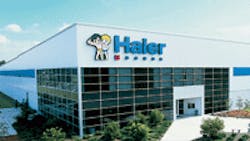Why Does China Like 'Made in America?'
Chinese manufacturing companies are finding a comfortable home in South Carolina. Since 1999, Chinese companies have invested $392.9 million in the state and created 1,993 jobs.
One of the reasons that Chinese manufacturers are choosing the United States to set up shop has to do with the preferences of its consumers. "Chinese consumers like the 'Made in America' label," explains John Ling, managing director, South Carolina-Asia office, which is based in Shanghai.
Surprisingly to many, U.S. production can also be cost-effective for Chinese manufacturers. "There are some tangible benefits to locating in South Carolina versus China, and that includes a much lower cost to acquire land as well as decreased electricity costs. This often offsets the increased labor costs," Ling says.
Becoming Global
While the United States wants to increase its exports, the Chinese government has that same goal, but with a different twist. China wants its manufacturing companies to acquire the experience of being global companies. "The policy of the government of China has shifted in that it now encourages Chinese companies to locate abroad, with the understanding that it has to be a profitable endeavor," explains Ling.
Chinese investment is proving a boon to South Carolina's economy. In 2010, China spent $2.16 billion on goods from the state. That's a 200% increase over the past five years.
The influx of Chinese capital into South Carolina increased in 2007 when the state signed a memorandum of understanding with the Chinese government to establish and designate South Carolina as a preferred U.S. location for Chinese businesses to operate and identified areas for enhanced cooperation between the two countries.
Learning the Culture
Ling says it is a complicated process for a Chinese company to locate in the United States. "It requires a team effort from the state and the company," he notes. "There must be an understanding of the culture, management style and way of thinking. The state needs to understand the decision-making process of Chinese companies; sometimes it's not the particular incentives that seal the deal but it is the comfort level of working in our state."
| Chinese Companies in South Carolina American Yuncheng Gravure Cylinder Inc., Spartanburg Bluestar Silicones USA Corp., York China Construction America of South Carolina Inc., Columbia Cosco Container Lines Americas Inc., Charleston Cosco Logistics (Americas) Inc., North Charleston E-P Equipment USA Corp., Inman Fuyao North America Inc., Greenville Greenfield Industries Inc., Seneca GSP North America Co. Inc., Spartanburg Techtronic Industries North America Inc., Anderson & Pickens Uniscite Inc., Laurens County (to open Q1 2014) |
The most recent company to set up shop in South Carolina is Uniscite, which announced a $70 investment in January of this year in a greenfield plant that will manufacture plastic film used in packaging food products. The plant, located in Columbia, will employ 100 and is expected to be operational by the first quarter of 2014.
The company chose the location due to "an excellent business environment and a ready and available workforce," according to Fang Wang, general manager of Uniscite Inc. Job-development credits, offered by the state in addition to pre-employment training, were part of the deal.
For Top-Eastern Group, a manufacturer of twist drills, South Carolina became one of its manufacturing locations when it took over a facility from Kennametal. The company retained about 100 employees but has added over 300 since then. "We have found a strong work ethic in South Carolina. The available talent pool has enabled us to grow as we needed to add support functions to the operation after we purchased it," explains Dale Erkkil, vice president, corporate development for Top-Eastern.
While the company has hired local managers, the owner of the privately held company is very hands-on in his leadership style and often travels from China, says Erkkil.
See Also
Site Location: A Comprehensive Approach Drew Chinese Printing Company to South Carolina
